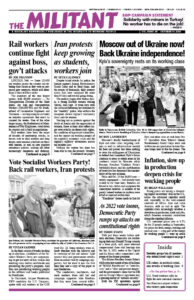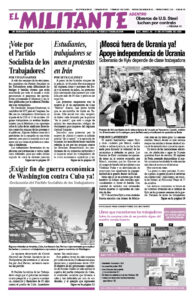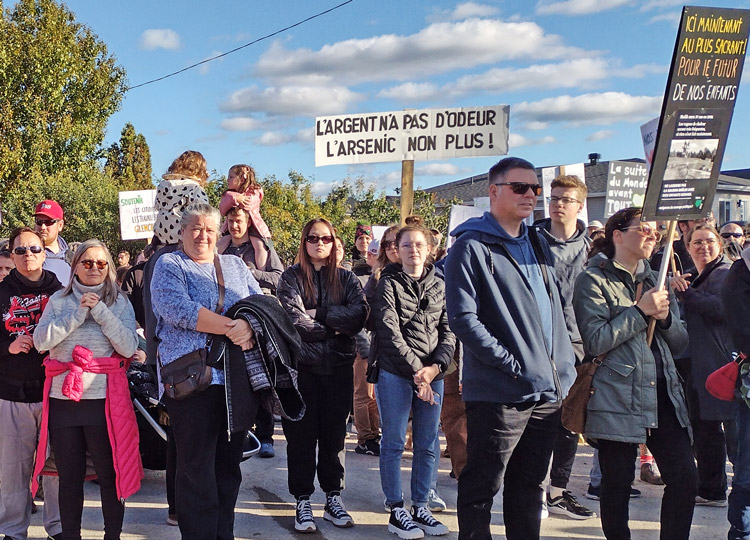ROUYN-NORANDA, Quebec — One thousand people of all ages, including many children, marched here Sept. 23 to protest emissions of arsenic by the Horne copper smelter located in the town. The march was led by a banner that read in French, “Our lives are worth more than their profits.”
The central demand was 3 nanograms of arsenic per cubic meter of air as soon as possible, within a maximum of five years. Presently the norm for arsenic in Quebec is 3 nanograms but the smelter is allowed to emit 100. Its permit is due for revision in November. The government and the company reached agreement in September to lower the level to 15 in five years.
Rouyn-Noranda is a mining town of 43,000 in northern Quebec over 600 kilometers (372 miles) north of Montreal. The smelter, which employs 650, belongs to Glencore, a major mining company based in Switzerland. It was built in 1927 along with a copper mine that closed in 1976. The foundry now recycles and refines materials, emitting many heavy metals dangerous to health.
The union representing the 400 production workers in the smelter, the Confederation of National Trade Unions, held a press conference Oct. 6 to explain its stand. “We must attain the threshold of 15 nanograms per cubic meter by the summer of 2027 at the latest,” said union President Stephane Larente, “and we have to continue to work to reach the national (Quebec) norm of 3 nanograms per cubic meter of air.” The union called for elected officials to make public each year the progress made by the smelter.
Provincial Premier Francois Legault visited the town Sept. 29, threatening, “If a majority of the population wants to close the plant, we’ll close the plant.”
Larente answered, “We must stop opposing jobs and the environment and dividing the population.”
Studies made public by the region’s Public Health entities in the past several years show that children in Rouyn had four times more arsenic in their bodies than those of Amos, about 45 miles away. The town has 30% more lung cancers, 50% more chronic pulmonary diseases and 25% more babies born with low weight than elsewhere in Quebec.
Martin Corvec, a plumber who works as a subcontractor in the smelter, spoke to the Militant at the march. “I do work in the plant, but that’s not a reason not to be here. I work in there with a big mask while on the other side of the fence there are women with their carriage and baby who are jogging. The moose we hunt, they tell us not to eat the organs.”
Emilie Robert, a march organizer, told the Militant her first child was born prematurely weighing roughly 4 pounds, while the second was full term at over 8 pounds. She had moved further out of town for the second pregnancy. “That and my concern for the population as a whole is why I am involved,” she said.
Nicole Desgagnes, a march organizer and spokesperson for ARET (Stop the Discharges and Toxic Emissions), said, “I was a nurse and then health care administrator before retiring, and I knew nothing about this. The premier is the only one brandishing the threat of plant closure. It’s to divide people. If they stopped processing the most toxic materials, the arsenic levels would drop.”
Ritha Doyon, a cleaner who lives right by the smelter, told this worker-correspondent when I knocked on her door, “Our opinion isn’t worth s–t, our health neither. I worked in there for four years. My nose ran, I had headaches as soon as I went in. As for me, they should close it until they attain the 3 [nanograms].”
Others in the town don’t agree. Diane Allard, who lives down the street from the foundry, said, “I’ve lived here all my life. I have three children, eight grandchildren and there is not one who is sick.”
Teaching assistants at the University of Quebec in Abitibi-Temiscamingue and professors at the local college joined the march. Jean-Sebastien Blais was at the march representing the Abitibi-Temiscamingue region of the Nurses Union of Quebec.
“I support the fight of working people of Rouyn-Noranda against the destruction of their health,” Katy LeRougetel, Communist League candidate in Montreal’s riding of Anjou-Louis Real and member of the Bakery, Confectionery, Tobacco Workers and Grain Millers union, said as she joined the protest in solidarity. “We can have no confidence in the bosses and their government. The workers and their unions must be at the center of protecting their health and safety and that of those who live around the smelter. It is wrong to oppose jobs and the environment. Workers can come together and find a solution that protects both.”


